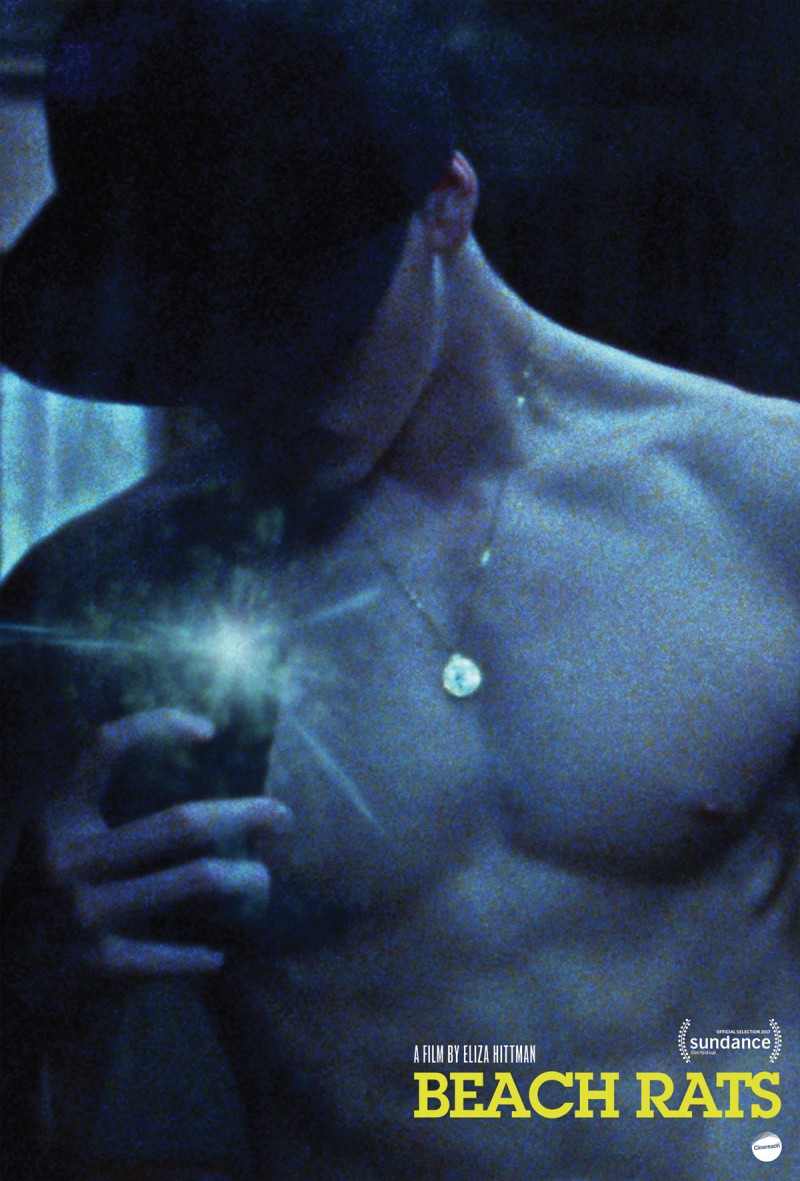by Dancin' Dan
 It's the time of year where we're all playing catch-up with everything we missed in theaters. This prepares us for that most sacred of cinephile traditions: End-of-year list-making!
It's the time of year where we're all playing catch-up with everything we missed in theaters. This prepares us for that most sacred of cinephile traditions: End-of-year list-making!
I had heard a lot of good things about Eliza Hittman's Beach Rats when it was released in theaters late this summer, but I wasn't able to catch it. But nothing I had heard about it prepared me for what I found. Beach Rats is nothing if not the inverse of the acclaimed (and currently playing) Call Me By Your Name; nearly everything in one is the opposite of the other.
It starts with our protagonists, Harris Dickinson's Frankie and Timothée Chalamet's Elio. Both are possessed of a certain amount of self-confidence but even more self-doubt...
Frankie's confidence comes from his body - he knows he's attractive and, even better, able to pass as straight - while Elio's comes from his mind and skill - it's not enough that he play Bach flawlessly, he must play it as Liszt would have, and then as Busoni would have played Liszt's version of Bach's. But both Elio and Frankie are much less confident in matters of the heart - Frankie's constant refrain is "I don't know what I like," and Elio can barely tell if the object of his affection is into him, let alone what to say or do once that question clears up.
And here we come to the important difference: Elio has the freedom to explore his desires in pretty much whatever way he sees fit, while Frankie most decidedly does not. Each is a product of his environment: Elio has the sunny life of bi-continental intellectuals, Frankie the darker life of a lower-middle class family in Coney Island. Frankie's father is dying of cancer, not even able to talk, and though mother cares for him deeply, her focus is decidedly elsewhere. Elio's parents are full of love and eager to push Elio towards experiences they feel would be good for him, and are always there when he needs them.
[SPOILERS] Elio's parents mostly let him roam around the Italian countryside free as a bird. That freedom is what allows Elio to get close with Oliver and explore with him in private (and not-so-private). In order to get any where near the same kind of freedom, Frankie goes into anonymous internet chat rooms late at night and tries to arrange meets with other men. In neighborhoods that aren't his own. Those meetings, when they aren't derailed by his friends, are drenched in fear - fear that they'll be found, fear that he won't like it, fear that something will go wrong. Frankie's life is lived in fear, too. He'll try to work gayness into conversations, to test the waters, but it's always laughed at and shut down by his friends. When he sees one of his tricks while he's out with his friends and his girlfriend, his whole world stops. He can barely breathe from the fear that he might be found out.
 Elio's only fear is that one day, Oliver will leave him. That he will go back to the States and the two of them will never see each other again. Which is inevitable. After a good cry, Elio can return to family and friends who love and support him. Given the words and actions of those closest to him when he moves towards revealing his true self, Frankie does not feel he has that kind of safety net, becoming trapped in a never-ending cycle of drugs, fear, and depression. [/SPOILERS]
Elio's only fear is that one day, Oliver will leave him. That he will go back to the States and the two of them will never see each other again. Which is inevitable. After a good cry, Elio can return to family and friends who love and support him. Given the words and actions of those closest to him when he moves towards revealing his true self, Frankie does not feel he has that kind of safety net, becoming trapped in a never-ending cycle of drugs, fear, and depression. [/SPOILERS]
Being a queer teen is hard. When all the TV shows, music videos, and movies you see are centered around heterosexual courtship, you can feel adrift. There's no template to follow if you're lucky enough to find other gay teens. But when you grow up with the space to explore who you are, it's more likely you'll land on your feet when things fall apart. Beach Rats and Call Me By Your Name present flip sides of the same coin - two films about LGBT teens trying to find themselves. In the latter, Elio gets the opportunity to explore his desires and find a measure of self-acceptance. Frankie's exploration is thwarted, leaving him in a much more dangerous place. These are both narratives that teenagers questioning their sexuality (and,more importantly, their parents) need to hear. How wonderful is it that we got both of them in the same year?